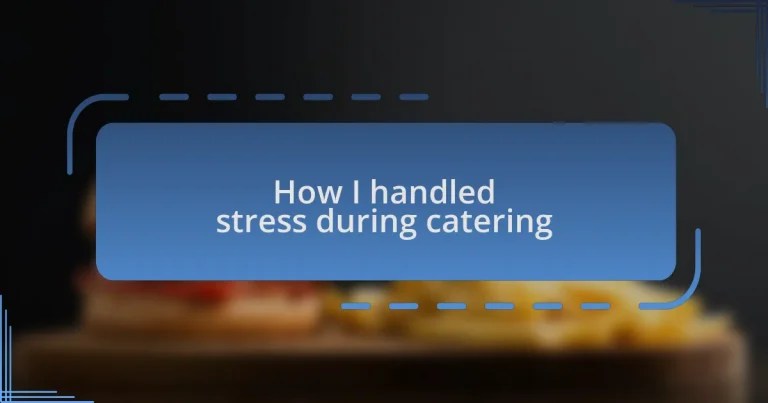Key takeaways:
- Maintaining a flexible mindset and effective communication are crucial for managing stress in catering environments.
- Strategic time management, such as creating detailed schedules and setting timed goals, helps to alleviate pressure during events.
- Fostering a supportive team culture by recognizing efforts and celebrating small wins enhances morale and collaboration.
- Preparation and clear communication can prevent chaos, while embracing flexibility allows teams to adapt to unexpected challenges.
Author: Olivia Hartwell
Bio: Olivia Hartwell is a contemporary fiction author known for her compelling narratives and vivid characterizations. With a background in literature and creative writing, she has a keen eye for detail and a passion for exploring the complexities of human relationships. Olivia’s debut novel, Whispers of the Heart, received critical acclaim and was nominated for several literary awards. When she’s not writing, she enjoys hiking in the mountains of Colorado and sipping artisanal coffee at local cafes. Olivia resides in Denver with her beloved rescue dog, Rosie.
Understanding stress in catering
In catering, stress often stems from the unpredictable nature of events. I remember one bustling afternoon at a wedding where the power went out just as I was about to grill the burgers. I found myself wondering, how do you keep your cool when everything feels like it’s spiraling out of control? That moment taught me that maintaining a flexible mindset is key.
Every event brings its own set of challenges—catering for a large group can be particularly daunting. When I underestimated the time needed to prepare, it felt like an avalanche of pressure. I had to pause, take a deep breath, and remind myself that panicking wouldn’t solve anything. Instead, I focused on prioritizing tasks and found that breaking down the workload made daunting challenges more manageable.
Understanding stress in catering also means recognizing how it affects both the team and the clients. I’ve seen firsthand how tension can ripple through the kitchen, impacting morale. It made me reflect: how can we foster an environment where we support each other during the busiest times? I learned that communication and teamwork are essential, helping to alleviate stress and create a more enjoyable atmosphere for everyone involved.
Importance of stress management
Managing stress is vital in catering because it keeps the energy positive and the service smooth. I recall an event where everything was going wrong—ingredients went missing, and a late delivery added to the chaos. Instead of letting frustration take over, I quickly reminded myself that the guests were looking for an enjoyable experience. This shift in perspective helped me approach problems more creatively, turning a potential disaster into a memorable evening.
Effective stress management also allows me to think clearly under pressure. During one particularly hectic festival, a sudden rush of customers tested my ability to keep pace. I took a moment to step back and assess my surroundings, which enabled me to delegate tasks to my team. I realized that staying calm not only boosted my performance but also encouraged my colleagues to rise to the occasion.
Moreover, managing stress positively influences the experience for everyone involved. When I maintain a level-headed attitude, my team mirrors that energy, and our collaboration improves significantly. Have you ever noticed how a small change in mindset can shift the entire atmosphere? I’ve often found that just a few encouraging words can make all the difference. Stress management is not just about personal coping; it’s about building a cohesive environment where everyone thrives, enhancing the overall catering experience.
Practical tips for stress relief
One practical tip for relieving stress that I’ve found incredibly effective is taking short, mindful breaks. During a busy catering event, I often feel the pressure mounting, and stepping away for just a minute to breathe and refocus can work wonders. Have you ever noticed how a brief pause can suddenly clear your mind? This simple act of stepping away allows me to recharge, ensuring I approach the next task with renewed energy and clarity.
Another technique I employ is creating a support system within my team. When things get overwhelming, sharing the load with colleagues not only diminishes stress but also fosters teamwork. I remember one hectic evening when one of my team members took over the grill while I handled customer requests. That moment of collaboration felt like a breath of fresh air—by working together, we turned a tense situation into one of laughter and shared success.
Lastly, I find that maintaining an organized work environment is crucial for reducing stress. I make it a point to have everything in its place before the chaos of an event begins. Have you experienced the frustration of searching for misplaced tools in the middle of a rush? By setting up efficiently, I eliminate those unnecessary panic moments and create a smoother workflow, which ultimately lessens the overall tension in the team.
Managing time effectively
When it comes to managing time effectively during catering events, I’ve discovered that creating a detailed schedule can be my greatest ally. On one occasion, I planned our burger truck’s setup and service flow down to the minute. I knew that when the clock ticks loudly, panic can set in, but having that clear plan made it feel more like a well-rehearsed performance. Isn’t it amazing how a little foresight can turn chaos into a melody of efficiency?
One strategy I use is setting timed goals for specific tasks. For instance, during a particularly busy festival, I allocated 30 minutes for prep, knowing it was crucial to keep the flow going. I can’t tell you how exhilarating it was to check that box on my list while the grill was heating up. It not only kept me focused but also gave me a sense of accomplishment, reminding me that every task contributed to our overall success.
Lastly, I realize that using time wisely is also about knowing when to pivot. I once had a catering gig where the unexpected downpour forced everyone to move indoors. Instead of dwelling on the sudden change, I adjusted our timeline on the fly, focusing on the tasks that could be done inside. By being flexible and adapting to the situation, I turned a potentially stressful moment into an opportunity, demonstrating that effective time management isn’t rigid—it’s about navigating the moment with confidence.
Creating a supportive team environment
Creating a supportive team environment is essential in catering, especially when the pressure mounts. I distinctly remember a particularly hectic evening serving at a local event. Amid the rush, I gathered my team for a quick five-minute chat, acknowledging their hard work and encouraging them to share any stressors they were facing. It was eye-opening to see how a simple conversation could uplift spirits and remind everyone that we were in this together. Have you ever noticed how collective encouragement can transform a daunting task into a manageable challenge?
Another vital aspect of fostering support is celebrating small wins. During one busy week, we served hundreds of burgers, and at every milestone—be it completing the first hour of service or hitting our sales target—I made it a point to recognize the effort. Those moments didn’t just motivate my team; they created a contagious energy that kept us going. Isn’t it wonderful how celebrating achievements, no matter how small, can enhance morale and tighten team bonds?
Moreover, I’ve learned that leading by example is one of the most powerful ways to create a culture of support. When I actively participated in the hustle, whether it was grilling burgers or managing the cash register, I could feel the team rallied around that shared energy. There’s a profound connection that forms when leaders aren’t afraid to roll up their sleeves. Have you experienced that sense of camaraderie while working together towards a common goal? It can be invigorating, showing that every member is valued and integral to the team’s success.
Personal experiences with stress
I remember an event not too long ago where the pressure felt insurmountable. The sun was blazing, and orders were piling up faster than our grill could handle. In that moment, I felt my heart racing and anxiety creeping in. Have you ever been in a situation where you simply had to pause to regain your composure? I stepped back for a moment, took a deep breath, and reminded myself that we had tackled challenges before. It was a small but necessary moment that grounded me.
During one particularly chaotic lunch rush, I experienced a moment of sheer panic as I realized our supply of buns was running low. I could feel the weight of stress weighing heavily on my shoulders. Instead of letting it consume me, I rallied the team to brainstorm solutions. That collective approach transformed my fear into action. I’ve learned that stress can either paralyze you or push you into creative problem-solving. Which one would you choose in a crunch?
There are times when the chaos of catering can feel overwhelming, but I’ve come to appreciate the importance of self-care in those moments. After that intense evening serving at a festival, I made it a point to unwind, reflecting on what went well and what needed adjustment. How often do we take a step back to evaluate our performance during stressful times? I realized that self-reflection not only calmed my nerves but also identified areas for growth, which is something I now prioritize regularly.
Lessons learned from catering challenges
When I look back at some of the most challenging catering events, one key lesson stands out: preparation truly is everything. I recall an event where we underestimated the number of guests, and panic set in as we ran low on our signature sauces. That experience taught me to always account for a buffer, ensuring we never find ourselves scrambling. Have you ever prepared for an outcome but still encountered surprises? It reminded me that no matter how skilled we are, we must remain vigilant and ready for the unexpected.
Another important lesson I learned is the power of clear communication within the team. During a bustling event, I once miscommunicated an order that led to a mix-up between two stations. The frustration was palpable, and in that moment, I realized how critical it is to maintain an open line of dialogue. Have you experienced a similar breakdown in communication? Since then, I’ve made it a practice to establish a quick huddle before each event to align everyone. It transforms the atmosphere from chaos to camaraderie, allowing us to tackle anything together.
Lastly, I found that embracing flexibility can be a game-changer. At one outdoor event, rain started pouring unexpectedly, forcing us to adapt on the fly. I could sense tension rising among the team, but I decided to focus on finding creative solutions rather than dwelling on the setback. How do you handle sudden changes? That day taught me that by maintaining a positive mindset, even the toughest challenges can lead to unexpected opportunities. Flexibility isn’t just about adjusting to circumstances; it’s about thriving within them.


